The hardest step
The journey of the athlete in Weightlifting from beginner to the qualifying standard for the national senior championship takes perhaps 3 years of goal driven, well organised, and consistent training. For the athlete, the first 3 years are full of wonder as there is so much to learn. The motivation to train is aided by a series of intriguing discoveries about the nature of Weightlifting skill, the complexity of the training process and the remarkable mental skills required to perform in the competition environment.
In the right training conditions, and depending to some extent on age, progress in the first 3 years is usually rapid. The male athlete might achieve a 200 Sinclair score in their first year, 270 in their second and 310 by the end of their 3rd year. For the female athlete the Sinclair scores might be 150, 200 and 230 for years 1, 2 an 3 respectively. Progress of this nature will create an expectancy of significant further improvement in years 4 and 5, and likely the athlete who has come this far will have aspirations to compete at the highest levels: World Senior Championships, Olympic Games, and Commonwealth Games.

But in reality, for aspiring athletes, years 4 and 5 are not like the first 3 years, Much of the motivating discovery is behind the athlete and the journey becomes more like a race. It is now a question of whether the athlete has the capacity and motivation to leave no (ethical) stone unturned in their quest for improvement. The athlete must be prepared to invest very considerable effort to correct as best they can all weaknesses and idiosyncrasies that affect their training and competition performance. Every factor must be examined for possible improvement including the time commitment, content and quality of training, the athlete’s physical functioning and well-being, and the daily routine of the individual outside the gym to ensure that the athlete’s life energy is focused on training. This is what it takes to succeed.
But it’s not all about the athlete. Coaches must also demonstrate their dedication to help athletes successfully take the next step and to move into contention for national team selection. Coaches must assume that they are leaders and role models to their athletes. The values they portray, their behaviour in the gym, the example they set, all matter a great deal. Coaches must be prepared to reflect on their own strengths and weaknesses, invest time in their own self-improvement and keep an open mind and never stop learning. They must expend great effort to plan, organise and monitor training, provide feedback, and generally go the extra mile to assist the athlete in a myriad of ways.
The next step is the hardest step. To reach the highest echelon, it is no longer acceptable for athletes to pay insufficient attention to warming up in training, flexibility, physical fitness, nutrition, sleep, recovery and injury prevention. It is not longer acceptable to train without discipline, to train without paying great attention to one’s weaknesses, to train with less than 100% conviction or to engage in other sporting activities that risk injury. For the athlete and the coach, there must be total dedication. To miss training would be like running a 1500m race and diverting on lap 3 to say Hi to a friend in the spectator stand. If you miss training, you cannot pretend to be running the race.
Why is it a race? It is well for the athlete to be mindful that the prize they seek, that is national team selection, is also coveted by many other individuals. To win this prize, athletes must not only reach qualifying performances but also be the very best in their category that the nation can produce. Every athlete who seeks national team selection must envisage that across the nation that there will be others training with great determination to beat you. To succeed in this task, therefore, you must prove that your attitude, your commitment, your meticulousness, your effort and your courage is second to none.
Do not commit the cardinal sin of thinking that time is on your side, because it isn’t. The clock is ticking.

